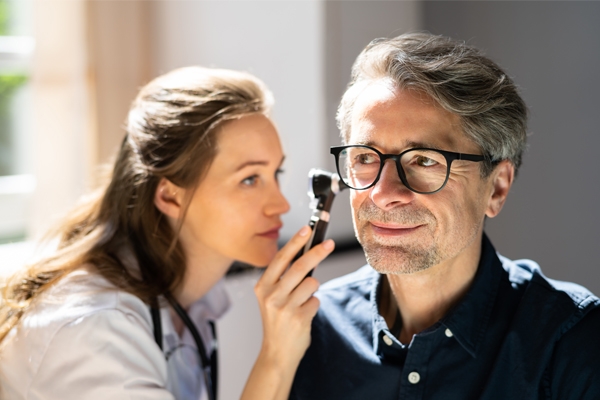How to Clear a Clogged Ear


How to Clear a Clogged Ear
3 min
Published October 22, 2024
A Comprehensive Guide on How to Clear a Clogged Ear
Experiencing a clogged ear can make you feel like you're underwater, even when you're on solid ground. This common issue can affect your hearing, balance, and overall well-being. But there's good news! Clearing a clogged ear is often simple. Understanding the proper steps can make all the difference, whether due to water, wax, or changes in air pressure.
Our hearing center has developed this guide offering expert advice on safe and effective methods to free your ears from blockages. Get ready to hear clearly and feel better because unclogging your ear doesn't have to be a challenge.
The Symptoms of Clogged Ears
Addressing a clogged ear early can help you find relief faster. The telltale sign is a noticeable drop in your ability to hear. However, clogged ears come with a range of symptoms that include earaches, a sense of itchiness within the ear, and a dizzy feeling that throws off your balance. Some people experience a ringing sensation known as tinnitus or feeling that their ears are stuffed or overly full.
You might also notice your ears popping more than usual, sounds becoming muffled, or even slight hearing loss. If your ear or sinuses are infected, symptoms could extend to draining fluid, a runny nose, a sore throat, and even a fever.
What Causes Clogged Ears?
Clogged ears can arise from a variety of sources, ranging from earwax buildup to changes in atmospheric pressure. One common culprit is the accumulation of earwax, which, while protective, can become excessive and block the ear canal. Devices such as earplugs and headphones may contribute to this buildup by preventing earwax from naturally exiting the ear.
Eustachian tubes, tiny passages connecting the ear to the throat, can also be a source of trouble. These tubes regulate ear pressure and help drain fluid but can become obstructed due to allergies, colds, or infections, leading to feelings of fullness and discomfort in the ears.
Situations like flying or scuba diving can exacerbate these issues by creating pressure changes that the ears struggle to adapt to. Noise exposure from loud environments can also temporarily affect hearing. While earwax and eustachian tube issues are prevalent, they often can be managed with proper care and attention.
Simple Methods to Unclog Your Ears
If you're dealing with clogged ears, don't worry! You can start with some easy solutions right at home. Swallowing, yawning, or flexing your jaw can help open up your eustachian tubes, providing immediate relief. Chewing gum or gulping down water are also great ways to ease the blockage. For an extra boost, try gargling with salt water to help clear out any congestion.
When these methods fail to work, it may be time to consider other techniques that are slightly more involved but equally safe. Try these methods that are approved by hearing doctors:
Use a Warm Cloth
Applying a warm towel can assist in easing ear blockages. Dampen a towel with warm water, squeeze out the excess, and gently place it over the blocked ear. This method soothes discomfort in your ear and adjacent areas.
Try Using Steam
Inhaling steam from a hot shower or a bowl of boiling water covered with a towel can soften mucus. Spend 10 to 15 minutes in a steamy room or lean over a bowl to breathe in the warm vapor.
The Valsalva Maneuver
The Valsalva Maneuver is essentially a term for popping your ears. First, close your mouth and pinch your nostrils shut. Next, breathe in deeply through your mouth, then gently exhale through your nose while keeping it closed with your fingers. This process helps equalize ear pressure. Afterward, chewing gum can keep your eustachian tubes open, especially handy during flights.
Wax Softeners
To soften and remove earwax safely, apply a few drops of baby oil, olive oil, mineral oil, glycerin, or hydrogen peroxide into your ear. Tilt your head for 10-30 seconds, allowing the liquid to penetrate deeply and drain your ear. Repeat for three to five days if necessary.
Water in the Ear
For those enjoying aquatic activities, excess water can linger in your ears. Gently wiggle your earlobe while tilting your head to the side to encourage drainage. Applying a few drops of vinegar or an alcohol solution can aid in drying out the moisture.
Invest in Earplugs
To keep ears dry while swimming, insert earplugs snugly before entering the water. For air travel, wearing earplugs can minimize discomfort caused by changes in cabin pressure. Insert them as the plane ascends and remove them after reaching cruising altitude.
Over-the-Counter Products
For extra help, you can find over-the-counter (OTC) products at any pharmacy. These include pain relievers and decongestants to ease discomfort and reduce inner ear swelling. Ear cleaning drops are also available and designed to soften and break up earwax safely. Always follow the product instructions carefully to ensure the best results.
Take Caution – What to Avoid When Unclogging Your Ears
When trying to unclog your ears, knowing what to avoid is just as crucial as the steps you take. For starters, never insert objects like cotton swabs or bobby pins into your ear canal. These objects can not only push the wax deeper but may also cause injury, including cuts or even a ruptured eardrum.
Regular cleaning isn't typically recommended by health professionals due to these risks. Also, steer clear of ear candling. Despite claims, it's not supported by science and can lead to serious injuries from hot wax. Always prioritize safety and seek professional advice from a hearing doctor at an audiology center for persistent issues.
When to Seek Medical Attention
If your ear remains clogged after trying these methods, it's important to consult a hearing specialist. Signs that you should seek professional attention from an ear doctor include pain that worsens, hearing that doesn't improve or any discharge from the ear.
Ear specialists at an audiology clinic can offer treatments tailored to your needs. They have the expertise to safely clear blockages and advise on maintaining healthy ears. Remember, taking action on ear health supports your overall well-being. A quick visit to an audiologist can have you back to experiencing the full range of sounds around you.




